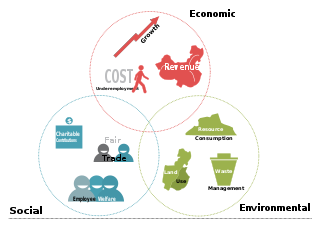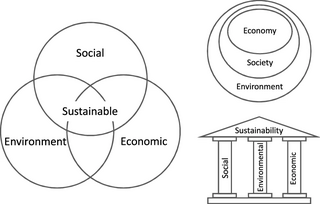
In economics, an externality or external cost is an indirect cost or benefit to an uninvolved third party that arises as an effect of another party's activity. Externalities can be considered as unpriced components that are involved in either consumer or producer market transactions. Air pollution from motor vehicles is one example. The cost of air pollution to society is not paid by either the producers or users of motorized transport to the rest of society. Water pollution from mills and factories is another example. All (water) consumers are made worse off by pollution but are not compensated by the market for this damage. A positive externality is when an individual's consumption in a market increases the well-being of others, but the individual does not charge the third party for the benefit. The third party is essentially getting a free product. An example of this might be the apartment above a bakery receiving some free heat in winter. The people who live in the apartment do not compensate the bakery for this benefit.
A local community has been defined as a group of interacting people living in a common location. The word is often used to refer to a group that is organized around common values and is attributed with social cohesion within a shared geographical location, generally in social units larger than a household. The word can also refer to the national community or global community.
The phrase sustainable industries is related to the development of industrial processes in a sustainable way. The phrase refers to greening of energy intensive industries such as the textiles, steel, cement, and paper industries.

The triple bottom line is an accounting framework with three parts: social, environmental and economic. Some organizations have adopted the TBL framework to evaluate their performance in a broader perspective to create greater business value. Business writer John Elkington claims to have coined the phrase in 1994.

Corporate social responsibility (CSR) or corporate social impact is a form of international private business self-regulation which aims to contribute to societal goals of a philanthropic, activist, or charitable nature by engaging in, with, or supporting professional service volunteering through pro bono programs, community development, administering monetary grants to non-profit organizations for the public benefit, or to conduct ethically oriented business and investment practices. While once it was possible to describe CSR as an internal organizational policy or a corporate ethic strategy similar to what is now known today as Environmental, Social, Governance (ESG); that time has passed as various companies have pledged to go beyond that or have been mandated or incentivized by governments to have a better impact on the surrounding community. In addition, national and international standards, laws, and business models have been developed to facilitate and incentivize this phenomenon. Various organizations have used their authority to push it beyond individual or industry-wide initiatives. In contrast, it has been considered a form of corporate self-regulation for some time, over the last decade or so it has moved considerably from voluntary decisions at the level of individual organizations to mandatory schemes at regional, national, and international levels. Moreover, scholars and firms are using the term "creating shared value", an extension of corporate social responsibility, to explain ways of doing business in a socially responsible way while making profits.

Sustainable tourism is a concept that covers the complete tourism experience, including concern for economic, social, and environmental issues as well as attention to improving tourists' experiences and addressing the needs of host communities. Sustainable tourism should embrace concerns for environmental protection, social equity, and the quality of life, cultural diversity, and a dynamic, viable economy delivering jobs and prosperity for all. It has its roots in sustainable development and there can be some confusion as to what "sustainable tourism" means. There is now broad consensus that tourism should be sustainable. In fact, all forms of tourism have the potential to be sustainable if planned, developed and managed properly. Tourist development organizations are promoting sustainable tourism practices in order to mitigate negative effects caused by the growing impact of tourism, for example its environmental impacts.
The "Melbourne Principles" for Sustainable Cities are ten short statements on how cities can become more sustainable. They were developed in Melbourne (Australia) on 2 April 2002 during an international Charrette, sponsored by the United Nations Environment Programme (UNEP) and the International Council for Local Environmental Initiatives. Experts at the Charrette were drawn from developing and developed countries.
Community building is a field of practices directed toward the creation or enhancement of community among individuals within a regional area or with a common need or interest. It is often encompassed under the fields of community organizing, community organization, community work, and community development.
Ecological sufficiency, or simply sufficiency, refers to the concept or strategy to reduce the environmental footprint of societies through moderating the need for energy, carbon and material-based services and products. The term was popularised by authors such as Thomas Princen, a professor at MIT, in his 2005 book The Logic of Sufficiency. As a goal, sufficiency is about ensuring that all humans can live a good life within planetary boundaries, meaning without overshooting the ecological limits of the Earth and thus limiting resource use and pollution. Princen argues that "seeking enough when more is possible is both intuitive and rational – personally, organizationally and ecologically. And under global ecological constraint, it is ethical."
The following outline is provided as an overview of topics relating to community.
Societal responsibility of marketing is a marketing concept that holds that a company should make marketing decisions not only by considering consumers' wants, the company's requirements, but also society's long-term interests.
Solidarity economy or Social and Solidarity Economy (SSE) refers to a wide range of economic activities that aim to prioritize social profitability instead of purely financial profits. A key feature that distinguishes solidarity economy entities from private and public enterprises is the participatory and democratic nature of governance in decision-making processes as one of the main principles of the SSE sector. Active participation of all people involved in decision-making procedures contributes to their empowerment as active political subjects. However, different SSE organizational structures reflect variations in democratic governance and inclusive participation. Ultimately, SSE represents a crucial tool in guaranteeing that social justice ideals are upheld and that the wellbeing of the most vulnerable populations is paid attention to during the planning processes.
Socially responsible marketing is a marketing philosophy that a company should take into consideration; "What is in the best interest of society in the present and long term?"

Sustainability accounting originated in the 1970s and is considered a subcategory of financial accounting that focuses on the disclosure of non-financial information about a firm's performance to external stakeholders, such as capital holders, creditors, and other authorities. Sustainability accounting represents the activities that have a direct impact on society, environment, and economic performance of an organisation. Sustainability accounting in managerial accounting contrasts with financial accounting in that managerial accounting is used for internal decision making and the creation of new policies that will have an effect on the organisation's performance at economic, ecological, and social level. Sustainability accounting is often used to generate value creation within an organisation.

Sustainability is a social goal for people to co-exist on Earth over a long time. Definitions of this term are disputed and have varied with literature, context, and time. Sustainability usually has three dimensions : environmental, economic, and social. Many definitions emphasize the environmental dimension. This can include addressing key environmental problems, including climate change and biodiversity loss. The idea of sustainability can guide decisions at the global, national, and individual levels. A related concept is that of sustainable development, and the terms are often used to mean the same thing. UNESCO distinguishes the two like this: "Sustainability is often thought of as a long-term goal, while sustainable development refers to the many processes and pathways to achieve it."
Creating shared value (CSV) is a business concept first introduced in a 2006 Harvard Business Review article, Strategy & Society: The Link between Competitive Advantage and Corporate Social Responsibility. The concept was further expanded in the January 2011 follow-up piece entitled Creating Shared Value: Redefining Capitalism and the Role of the Corporation in Society. Written by Michael E. Porter, a leading authority on competitive strategy and head of the Institute for Strategy and Competitiveness at Harvard Business School, and Mark R. Kramer, of the Kennedy School at Harvard University and co-founder of FSG, the article provides insights and relevant examples of companies that have developed deep links between their business strategies and corporate social responsibility (CSR). Porter and Kramer define shared value as "the policies and practices that enhance the competitiveness of a company while simultaneously advancing social and economic conditions in the communities in which it operates", while a review published in 2021 defines the concept as "a strategic process through which corporations can turn social problems into business opportunities".
Systemic development is a process of thinking about development which uses a systems thinking approach to create a solution to a social, environmental, and economic stress which the world is suffering from.
People-centered development is an approach to international development that focuses on improving local communities' self-reliance, social justice, and participatory decision-making. It recognizes that economic growth does not inherently contribute to human development and calls for changes in social, political, and environmental values and practices.
Sustainability marketing myopia is a term used in sustainability marketing referring to a distortion stemming from the overlooking of socio-environmental attributes of a sustainable product or service at the expenses of customer benefits and values. Sustainability marketing is oriented towards the whole community, its social goals and the protection of the environment. The idea of sustainability marketing myopia is rooted into conventional marketing myopia theory, as well as green marketing myopia.
Traditionally, market orientation (MO) focuses on microenvironment and the functional management of an organisation. However, contemporary organisations have widened their focus to incorporate more roles, functions and emphasis on the macro environment. Firms have been concerned with short run success and often not taken into account the long-run ecological, social and economic effects from their activities. Despite growth in the MO concept, there is still a need to reconceptualise the concept with a greater emphasis on external factors that influence a firm.





